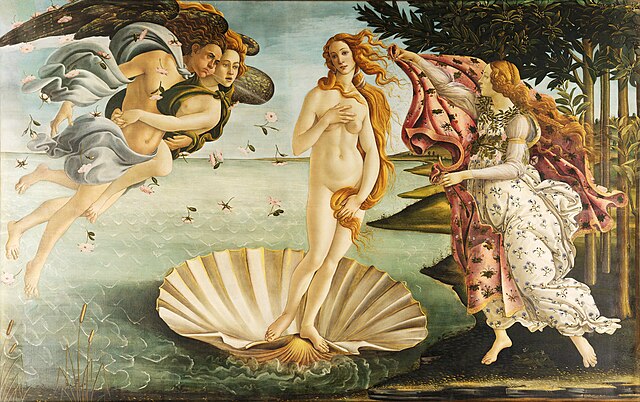The Greeks also adopted the seven day week but translated the Babylonian names into Greek names from their astrology and religion, such as Ares, Hermes, Zeus, Aphrodite, and Cronus.
 |
| The Birth of Venus, Sandro Botticelli |
Then, along came the conquering Romans, who adopted the same seven day system but translated the celestial bodies into Latin names: Sol, Luna, Mars, Mercury, Jupiter, Venus and Saturn. Names which are still evident in the French days of the week, used today.
The seven-day week system spread to Britain and the Anglo-Saxons translated the planetary names but used the names of their own deities, which is why in English we have days of Tiw, Woden, Thor and Freya; but they kept Saturn.
| Lundi moon day | Mardi 'Mars day' | Mercredi 'Mercury day' | Jeudi 'Jupiter day' | Vendredi 'Venus day' | Samedi 'day of the Sabbath' | Dimanche 'day of the Lord' |
Monday moon day | Tuesday Tiu's day | Wednesday Woden's day | Thursday Thor's day | Friday Freya's day | Saturday Saturn day | Sunday Sun's day |
The seven day system spread around the world and was translated in terms of local religious deities and customs.
in AD 321, the Emperor Constantine decreed that the "dies solis" (Sunday) would be the day of rest for Christians; this also served to separate the Christians from the Jews, as the Jewish rest day, called Shabbat, is observed from a few minutes before sunset on Friday evening until the appearance of three stars in the sky on Saturday night.| Japanese | 月曜日 (getsuyōbi) 'moon day' | 火曜日 (kayōbi) 'fire day' | 水曜日 (suiyōbi) 'water day' | 木曜日 (mokuyōbi) 'wood day' | 金曜日 (kinyōbi) 'metal day' | 土曜日 (doyōbi) 'earth day' | 日曜日 (nichiyōbi) 'sun day' |
